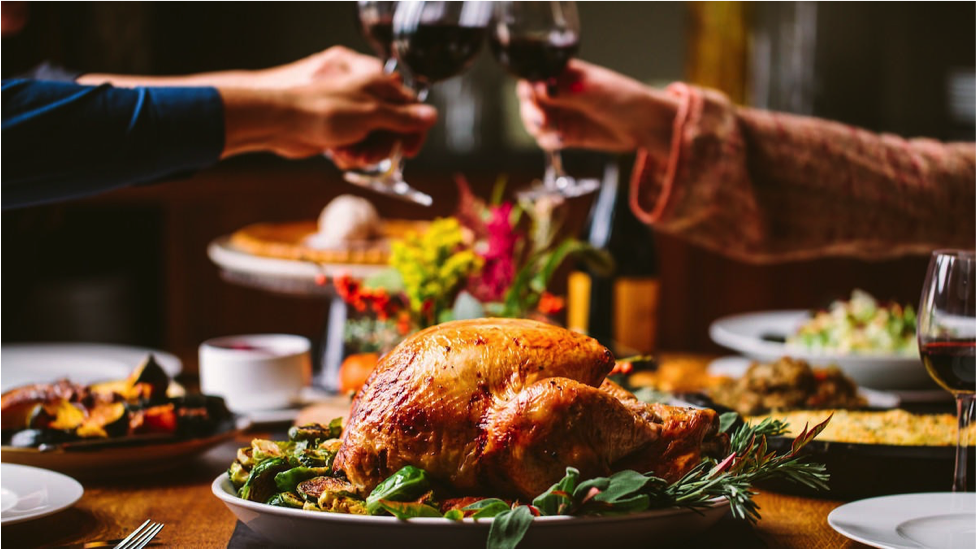With the holidays swiftly approaching, there’s a lot of discussion around “guilt-free desserts” and “calorie-smashing workouts” to make up for our inevitable gluttony. While it’s all well and good to have healthy habits in place that offset especially calorie-rich times of the year, it seems that now would be a good time to lay the foundation for what it means to have a healthy relationship with the food that we eat. Hopefully, this will provide you with a new way of relating to your meals this holiday season.
Eating food is a biological necessity – meaning that we must eat to survive. It would make sense, then, that we should be highly motivated to eat; likely pretty often. The way mother nature has encouraged us to keep eating is to make the act of eating highly pleasurable. Hopefully you’ve experienced this before, how a delicious meal triggers a deep sense of satisfaction and everything is alright in the world after sharing a hearty feast. Even at birth we come racing out of the womb; we cry, and are given breast milk to calm us down. This becomes deeply ingrained into our DNA that food and nourishment will make us feel better.
The psychology of eating is the discipline that acknowledges that, because we absolutely must eat to stay alive, we all have a relationship with food which is centered around pleasure. If we have a healthy relationship with food, we recognize the critical role food plays in our lives and we honor it. For some of us, our relationship with food might be troublesome or feel completely non-existent. As with any relationship in your life, it takes work to make it a good one, and our relationship with food is no different.
Here are a few ways that you can cultivate a healthy and satisfying relationship with food that will leave you feeling much better after every meal.
Derive More Pleasure From Your Meals
With eating being an absolute necessity for our survival, it would make sense that evolution would have given us taste buds and chewing mechanisms to make the act of eating pleasurable. Since the act of eating is meant to be enjoyable and delicious, our brain expects its pleasure senses to be activated by a meal. When you have an unenjoyable meal or snack, your brain doesn’t recognize that it has just eaten.
For example, if you wolf down a protein bar on your way out the door in place of breakfast, your brain will likely say, “I don’t remember eating breakfast…we must not have eaten…I’m still hungry!” Despite having taken in a few hundred calories, you may find yourself reaching for more food a couple of hours later, even if you physically don’t need the food.
The other problem with eating on the go or absentmindedly is that you are short circuiting your body’s ability to process the food you’re eating. Approximately 30% of digestion happens in the brain because of something called the Cephalic Phase Digestive Response. This means that your brain plays a key role in the actual digestion and assimilation of the calories you’re taking in. As a little experiment, think of biting into a lemon right now and take notice of how your salivary glands immediately get to work. By thinking about food and anticipating its arrival on your tongue, your brain kicks into gear a whole host of digestive responses that are critical to processing the food you eat. In short, if you’re going to eat food you need to think about food, and it needs to be enjoyable to be effective.
Stop Running from the Lion
As I’m sure you’re already aware, our digestive systems are incredibly sensitive. While eating, sleeping, and having sex are all critical parts of life, they’re often the first biological functions to get thrown out the window when we’re under stress. Much like having a hard time falling asleep at night or getting excited for sex with your loved one, stress can also negatively impact your ability to digest your meals. Imagine you are being chased by a lion. Your body isn’t concerned about getting some shut eye, getting turned on, or getting distracted by chocolate ice cream. Instead, blood is shunted away from your core to your arms and legs, so you can run like hell or fight for your life!
If your brain perceives stress it will impact your digestion. If you struggle with upset stomach, acid reflux, or any other stomach issues, simply try slowing down at meal time for a good five minutes to allow your body to rest and digest. Taking a few deep breaths before your meal is enough to transition you out of the stress response.
Enroll All Five Senses At Meal Time
To enroll your brain in the act of eating, you want to engage as many of your senses as possible while you’re enjoying food. To make your meals more visually appealing, try setting the table to make the space more inviting and plate your food in such a way that makes it look delicious; which is where, believe it or not, a nice garnish can go a long way. Try changing the music in the room to encourage casual conversation and relaxation. During your meal, be sure to chew each bite, and focus on the taste of the food you’re eating. This may sound overly simple, but I would bet that if you thought back to your last few meals, you might recognize that you couldn’t pinpoint any characteristics beyond salty, sweet, hot or cold. Simply becoming aware of all five senses at meal time will radically impact your experience and lead to a more fulfilling relationship with your nutrition.
Choose To Be Your Best-Self
While this may seem overly radical, the act of eating healthy, delicious food is a way of choosing to be your best-self every day. If you ignore food and ignore eating you’re denying your body the nutrients that it needs to not only survive, but also to thrive. For a lot of people, in their relationship with food, eating becomes an inconvenience – something merely necessary that gets in the way of “real” work. If you race out the door and grab a pastry on the way to work, you’re affirming to yourself that you don’t have enough time to take care of yourself and you’re not putting your best foot forward. By waking up each day and making it an intention to sit and enjoy a hearty breakfast with your family, you’re saying, “I’m choosing to savor the meal that’s going to fuel the best version of myself today.”
This holiday season, I encourage you to make self-care and self-nourishment a priority, and start to develop a healthy relationship with food that leaves you feeling strong, satisfied, and enabled so you can be the best version of yourself. Eat slowly, take the time to taste the food, relax and enjoy the time with family and friends.
About the Author:
Heather Kelly is the creator of Heather’s Choice Meals for Adventuring. Inspired by her personal backcountry trips, Heather strives to create healthy, delicious meals and snacks for folks headed out on epic adventures. You can order her meals and snacks online at heatherschoice.com and use the coupon code JOMH to save 10% off your next order.




